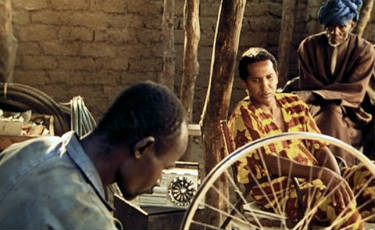Lucidno LA VIE SUR TERRE
|
After the letter to his father in which Sissako announces his desire to return to be with his father and make the film we see him arrive in Sokolo on a bike. First we see just his reflection crossing the screen from left to right and then sitting in the canoe with his bike going from right to left. He no longer wears the drab dreary gray winter attire we saw in Paris but instead wears an African outfit that blends into the colors of his film. The outfit is quite different from the local boubous and western style pants and shirts the other people wear. In an interview he reveals that his mother had given it to him in Bamako (Barlet, 1998). So the returning exile in essence never truly fits in perhaps. Sokolo is used to the comings and goings of its inhabitants and their relatives. It is part of the way in which it remains connected—they bring news from Europe and the surrounding African countries. The town keeps abreast of events elsewhere—news broadcasts from Paris—and what is not evident in the film--the local radio station also broadcast local news from around the continent (Joris, 157). But it is a one way exchange. The rest of the world seldom, if ever, hears about Sokolo. {niftybox background=#8FBC8F, width=375px} Life on Earth thus forces us to consider a number of related issues. How feasible and, indeed, how desirable is connectivity in Sokolo The film also emphasizes the one way flow of information. Consequently, one of the issues to be considered is whether the internet can in fact "empower" people at the local level or whether it serves as yet another medium for the dispersal of Western culture and ideas.{/niftybox} Sissako shows that the town's people are fully aware of their lack of consumer goods. In one scene a man called Keita shows Coulibaly, the photographer, a magazine photo. "Isn't she beautiful?" He exclaims. "Not bad" Coulibaly replies. "She's Japanese." The viewer of course imagines a woman but instead we see a picture of Isuzu jeep. He says it's the latest model. "She is powerful, it's a real powerhouse." Surrounded by donkeys and bicycles the man dreams of owning a gas guzzling four wheel drive. He appears later in the film and tells Coulibay that in Abidjan whites have houses with doors "when you enter the doors open by themselves" says Keita. The photographer finds it hard to believe. Joris met several young men who had been to work in Abidjan where the standard of living was higher and it was possible to find work. She also noted that a number of families had left Sokolo for Brazzaville in the Congo. This exodus provided Bina, the postmaster, with extra money as calls between Brazzaville and Sokolo increased. This coming and going brings ideas and influences to Sokolo.Yet still the ties of Mali's colonial past have not yet been broken. Sokolo listens to the millennium celebrations live from Paris—it's not clear how many of the townspeople understand it. International news is broadcast in French direct from France. The educated townspeople speak French and some of the young men dream of Paris. People in Sokolo are intensely aware of the outside world yet the "other" knows little of them. It is the same unequal relationship that has plagued Africa since European contact. As Cesaire says "Africa's historic tragedy was less its coming in contact with the rest of the world too late than the way the contact occurred. It was when Europe fell into the hands of the industrial leaders extremely lacking in scruples that it expanded." Although I would argue that European exploitation of Africa and the unequal relationship started long before that in the 16th Century even before European Industrialization. Nevertheless, those encounters have always been unequal. |
Life on Earth thus forces us to consider a number of related issues. How feasible and, indeed, how desirable is connectivity in Sokolo The film also emphasizes the one way flow of information. Consequently, one of the issues to be considered is whether the internet can in fact "empower" people at the local level or whether it serves as yet another medium for the dispersal of Western culture and ideas. Clearly the immediate problems for most of the town's people are the birds and the increasing cost of irrigation. The rural areas of Africa are being neglected as governments focus on the cities. Yet to say that Sokolo is cut off from the rest of the world is also erroneous. Sokolo remains deeply aware of the wider world and their relationship to it. It is in fact the rest of the world that needs to be aware of Sokolo. The film also demonstrates the importance of small communities like Sokolo for the millions of Africans living in the Diaspora where a place of return is paramount in helping their survival. And in Cesaire's words, keeping alive the "desire of return."
Works Consulted "Life on Earth/La Vie Sur Terre" Notes by Michael Denbow California Newsreel Library of African Cinema entry on Life on Earth.
|


